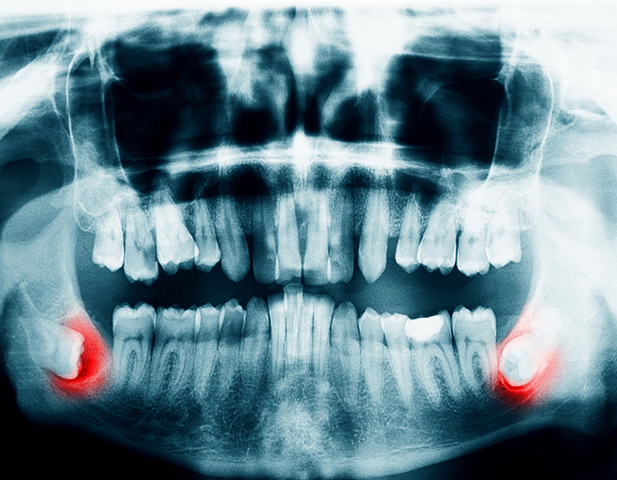 Wisdom teeth, much like a human’s appendix, is a biological blast from the past. It is believed they were essential to early humans who had much more space in their mouths, but aren’t necessary for modern life. In fact, they can literally be a real pain. These teeth typically emerge in our late teens or early 20s, often misaligned, crowding the other teeth, or remaining partially below the surface of the gum line where they can cause discomfort and possible damage to the jawbone and nerves. Because of this, nearly 85 percent of adults in the U.S. have had their wisdom teeth removed to protect their oral health.
Wisdom teeth, much like a human’s appendix, is a biological blast from the past. It is believed they were essential to early humans who had much more space in their mouths, but aren’t necessary for modern life. In fact, they can literally be a real pain. These teeth typically emerge in our late teens or early 20s, often misaligned, crowding the other teeth, or remaining partially below the surface of the gum line where they can cause discomfort and possible damage to the jawbone and nerves. Because of this, nearly 85 percent of adults in the U.S. have had their wisdom teeth removed to protect their oral health.
Not surprisingly, our patients have many questions about wisdom teeth. We’ve compiled a list of some of the most frequently asked questions about wisdom teeth. But for specific information on how wisdom teeth can affect your dental health, always talk with your dentist.
Wisdom Teeth FAQs
Does everyone have wisdom teeth?
Most people have 4 wisdom teeth – also called third molars. While some people have more than 4, others have fewer, and some have no wisdom teeth at all. There are also people that have wisdom teeth, but they can only be seen in x-rays because they never erupt through the gums.
Should you always get wisdom teeth removed?
Whether your wisdom teeth have to be removed or not depends on their positioning and how they will affect the rest of your teeth. Sometimes, wisdom teeth have room to erupt and don’t need to be extracted. If this is the case, your dentist may recommend you keep your third molars. Some dentists and oral surgeons recommend having wisdom teeth out before you’re 20, while others think it’s best to wait and remove wisdom teeth only if there is a problem, especially if you’re over 30. Your dentist can help you decide which approach is right for you.
There are several circumstances that would make removing your wisdom teeth the obvious best option:
Impaction – If there isn’t enough room for your wisdom teeth to erupt, they can become impacted, causing them to grow in at an angle. You may experience pain or discomfort while eating due to impaction.
Damage to other teeth – Impacted wisdom teeth can push against your second molars, potentially damaging them and making them more susceptible to tooth decay.
Periodontal disease – If the spaces between your molars become so tight due to impaction that brushing and flossing becomes ineffective, bacteria could begin to thrive and lead to cysts and periodontal (gum) disease.
How will I know my wisdom teeth are coming in?
As the wisdom teeth come in, they can be uncomfortable – announcing their arrival with pain at the back of your mouth, behind your molars. The gums in those areas will often be red, inflamed, and tender to the touch. You may be able to see or feel the tips of the teeth poking through the gums. Wisdom teeth pain can be constant for some, while other people only experience discomfort when chewing food or touching the area. And then there are a few lucky people who don’t experience any pain when their wisdom teeth erupt.
Can you be too old to have wisdom teeth removed?
There is no age limit for having wisdom teeth removed, and it isn’t uncommon for those with impacted teeth to not have problems until they’re in their 30s or 40s. However, older patients frequently experience more difficult surgeries and longer recovery periods, so dentists often recommend removing wisdom teeth as early as possible.
Can wisdom teeth affect braces?
For patients with plenty of space in their mouths, a dentist may recommend a wait-and-see approach. Most orthodontic patients have their braces applied well before the wisdom teeth erupt. In this case, your orthodontist may order X-rays once your orthodontic treatment is completed to see what, if any, progress has been made in the development of your wisdom teeth.
If any pressure is being put on the teeth, and you’re not being diligent about wearing a retainer, you may end up having your teeth shift slightly. If this is the case, it might be necessary to remove the teeth.
For those who opt for braces in their later teens or early adulthood, an orthodontist could recommend that their wisdom teeth be removed first to ensure that the orthodontic work isn’t affected.
What will the procedure be like?
When having wisdom teeth removed, you can choose whether you want to have the procedure done under general anesthesia, or under lighter sedation through nitrous oxide or sedatives. Either way you’ll receive local anesthesia to numb the area – so you won’t feel pain during the procedure. But you will need someone to drive you home after it’s done.
If you choose general anesthesia, you should not have anything to eat or drink at least 6 hours before the surgery. During the procedure, you’ll be sedated as the oral surgeon removes the teeth. When it’s all over, you’ll likely feel sleepy for several hours.
If you choose lighter sedation, you’ll see and hear what’s happening. You’re likely to experience some vibration if a surgical drill is used, along with pressure as the surgeon pushes on the tooth. But you won’t experience pain, and the sedation should relax you and help relieve any anxiety.
What is recovery like after getting my wisdom teeth removed?
After your designated driver takes you home, you can expect to be drowsy or sluggish for a while from the effects of the anesthesia or sedation. Your dentist will probably also prescribe medications to alleviate pain or you can take over-the-counter medications as well. Consult with your dentist or surgeon on medications and dosage options prior to your procedure.
Every patient’s recovery is different. Some experience pain and swelling for several days after the procedure, while others are ready to go back to school the next day. You can expect to be on a liquid diet for the next 24 hours, then dine exclusively on soft foods for the next 4 or 5 days.
Are there any risks to wisdom tooth extraction?
With any types of surgery, there are risks. About 1 in 20 patients develops an infection, 1 in 100 has hard-to-control bleeding and another 1 in 100 loses some feeling in the lips or tongue, which is usually temporary.
Another complication that can occur with wisdom tooth extraction is a condition called “dry socket.” After the wisdom tooth is removed, a blood clot forms in that area as part of the healing process. If the blood clot becomes dislodged or dissolves before the area is sufficiently healed, it can leave the nerves in the area exposed to the air, food, or fluids, and the socket open to infection. This can be a painful condition, but is treatable with pain medications and antibiotics.
Because smoking is a big risk factor for dry socket, avoid cigarettes, cigars, and any other tobacco products for a day or so after your surgery. If you take birth control pills, ask your dentist about performing the extraction on a day when you are getting the lowest dose of estrogen. The hormone can affect the ability of the blood to clot. Also, check with your dentist about other medications you are taking that can interfere with normal blood clotting. After surgery, avoid drinking through a straw and spitting for the first few days, or rinsing your mouth more than your dentist recommends. And when you do rinse, rinse gently.
What’s the Best Course of Treatment for Your Wisdom Teeth?
Pointe Dental Group can provide you with a complete examination, answer your questions, and discuss your treatment options. Schedule an appointment with us today! New patients can receive FREE comprehensive exam and consultation, plus a full panoramic x-ray with a paid cleaning procedure (a $200 value)!
Grosse Pointe Farms: (313) 881-2480
Shelby Township: (586) 803-8300
Don’t miss a thing! Connect with us on Facebook.
